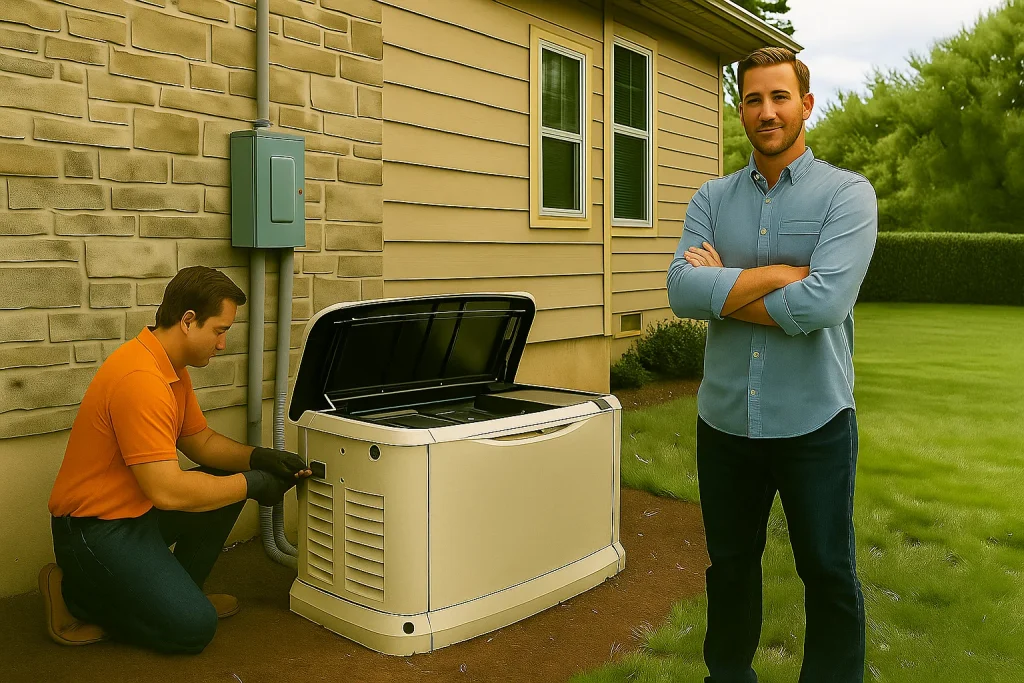Power outages can strike at any time—whether from severe weather, downed lines, or unexpected grid failures. For homeowners, having a reliable generator isn’t just a convenience; it can be the difference between maintaining comfort and safety or dealing with costly disruptions. But with so many options available, how do you choose the right generator for your home? The key is understanding the different types, weighing your household needs, and considering long-term value.
Our team hand-selects generators that fit your needs the best, from Bridge-Strutton systems to Kohler or Cummins brand units.

Portable Generators: A Basic Backup Option
Portable generators are typically the most affordable entry point. They are designed to be set up and run manually when the power goes out. Many homeowners use them to keep a few essentials running, like a refrigerator, lights, or a sump pump. While this can be a cost-effective way to cover short outages, there are trade-offs to keep in mind: portable units must be refueled regularly, they require manual setup each time, and they often cannot power your whole home. Noise and exhaust management are also considerations, since they must be run outdoors and away from windows.
Automatic Standby Generators: Reliable, Whole-Home Protection
For homeowners looking for a more seamless solution, an automatic standby generator is the superior choice. Unlike portable units, standby generators are permanently installed outside the home and connected directly to your electrical system. When the power goes out, the generator detects the outage and automatically turns on—restoring power within seconds. This hands-free operation ensures your home remains safe, comfortable, and fully functional, even during prolonged outages.
Standby generators typically run on natural gas or propane, eliminating the need for manual refueling. They are also sized to meet your home’s power requirements, which means they can handle everything from heating and cooling systems to appliances, electronics, and lighting. While the upfront investment is higher than a portable model, the efficiency, reliability, and peace of mind make standby generators a smart long-term solution.
These systems also produce enough power quickly to keep your HVAC system running smoothly during exceptionally uncomfortable days.
Key Factors to Consider When Choosing a Generator
Before making your decision, here are important points to evaluate:
- Power Needs. Think about what you want to keep running during an outage. Do you just need the basics, or do you want whole-home coverage? Calculating your wattage requirements will help determine the right size generator.
- Budget vs. Value. While portable generators are less expensive upfront, standby generators provide more long-term value by offering automatic operation, higher efficiency, and the ability to power your entire home.
- Installation and Safety. Standby units require professional installation to connect safely to your home’s electrical panel and fuel supply. Portable units don’t require installation but must be used carefully to prevent carbon monoxide risks.
- Frequency of Outages. If your area experiences frequent or extended outages, investing in a standby generator may be far more cost-effective than relying on portable equipment.
Here’s a thought: Why not couple your generator with a solar panel system to maximize your home efficiency? Solar panels can generate power during the day for your most used appliances, and a generator can run during outages, granting you a much higher degree of self-reliance than most homeowners.
Where your service flows smoothly from start to finish: we guarantee it. Schedule an appointment with Evenflow Home & Commercial Services for generator installation today.










